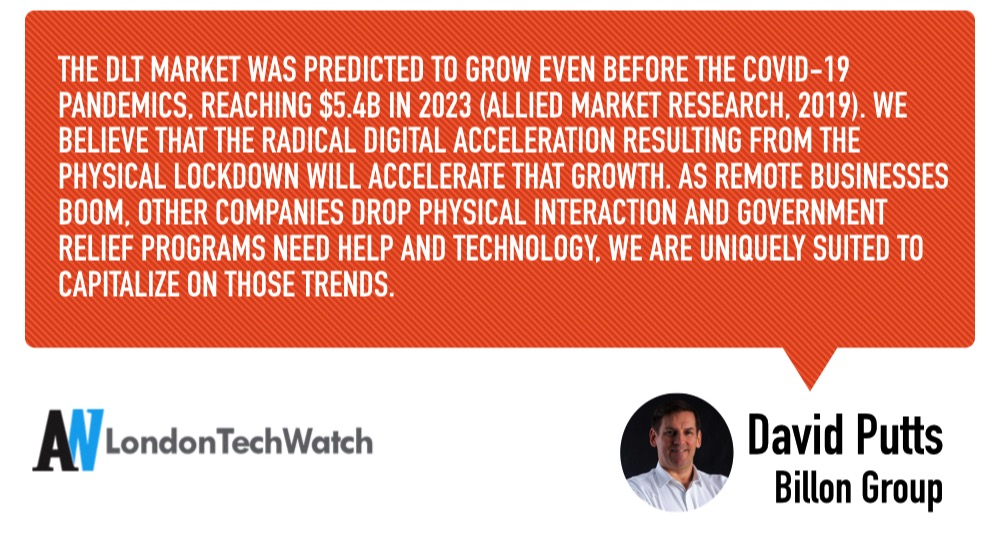In mid-April, retail banks in Poland began providing clients with notifications of commissions and fee changes on the blockchain, powered by Billon Group. The startup, founded in 2012, is emerging as a leader in the distributed ledger technology (DLT) market. The first to digitize national currencies and store and transact assets in the form of distributed digital cash, Billon Group also facilitates the storing, processing, and publishing of whole documents on its chain. For example, the platform allows for the publishing certificates, as “on-chain” digital copies to help people prove credentials when they cannot access a physical form.
London TechWatch sat down with Chief Growth Officer David Putts to learn more about the future of DLT, Billon Group’s expansion plan, and recent funding, which brings its total funding to €13.9M raised over six rounds.
Who were your investors and how much did you raise?
We concluded Series A financing with over $6M of equity being issued to existing and new investors. Participants in this round were led by Billon’s new CEO Wojtek Kostrzewa. They include FIS, Mencey Capital, Rising Tide, VCF III, and existing investors, most of whom are board level executives and experts. This round takes the total funding to over $16M, including grants.
 Tell us about the product or service that Billon Group offers.
Tell us about the product or service that Billon Group offers.
Billon created a new high-performance distributed ledger technology (DLT) system which unifies national currency transactions, documents on-chain, and identity management into a single system. It is a next-generation form of blockchain that was designed explicitly to comply with payment and data protection requirements, as Billon holds e-money licenses from regulators in the UK and in Poland. Billon overcame roadblocks preventing enterprise blockchain adoption, with its technology proven in open core banking engines, instant incentives, and loyalty solutions, micropayments, and GDPR-compliant document and privacy management. As a result, we are uniquely suited to unleash the transformational capabilities of blockchain technologies, especially now in the times of COVID-19 pandemic and its economic consequences.
What inspired the start of Billon Group?
Billon’s founder, Andrzej Horoszczak, began formulating central ideas behind the company working as a programmer and investment manager on Wall Street and in the City before the 2008 crisis. Andrzej developed skills as a cryptologist and financier, allowing him to see the flaws of the existing payments infrastructure: outdated IT, spiraling costs, and vulnerability. He learned about it first-handed years later in 2010, as the CEO of a health & wellness portal who sought a solution for convenient micropayments but was frustrated by the cost and clumsiness of card and bank transfers. While evaluating bitcoin and other early blockchain projects, Andrzej was inspired by the promise of distributed architecture but soon realized that regulators and banks required a different approach. He then assembled a team of experts, scientists, and consulted with regulators to leverage the core concepts of blockchain technologies with a remit to look beyond its limitations. Together with the cofounder Robert Kałuża, head of strategic analysis of Orange office in Warsaw, the new team set up to build a new type of distributed ledger which was both high performance and able to comply with payment regulations, with capabilities for both national currency payments and publishing documents as well.
After years of work as an R&D project, Billon Group was incorporated in December 2015 in London to commercialise the technology. The remainder of the board joined soon after, including myself as a person securing fundraising and international partnerships. Jacek Figuła from Cisco joined to drive commercialisation. And since January 2019, Wojtek Kostrzewa, a seasoned C-level executive with almost 30 years of experience in leading banks and media, joined as CEO while Andrzej remains the largest shareholder and CTO and Chief Visionary Officer. Today, the company is based in London but retains its Polish root as the majority of the staff work in the R&D center in Poland.
How is Billon Group different?
There are two basic differences between Billon and other blockchain-based solutions:
Regulatory compliance: Billon platform has been designed from the beginning to fulfill UK and EU regulations relevant for financial transactions and data protection. We are the first to digitize national currencies, storing and transacting assets in a form of distributed digital cash. Competitive solutions, originating mostly in the United States, compensate for other blockchains’ inability to comply by using databases and additional technical layers outside the DLT itself, thus introducing more cost and risk of complexity.
You are seconds away from signing up for the hottest list in LondonTech! Join the millions and keep up with the stories shaping entrepreneurship. Sign up today
Capability of processing data as part of a transaction: Billon has the unique features of storing and processing whole documents “on-chain”. Other solutions are able to write the hash of the document only, while the document itself is kept in the traditional database – with a risk of a loss in case of database failure.
Billon protocol and architecture has been also optimised to process a large number of transactions at a given time, with highly scalable network and lightweight nodes, which are able to operate even on mobile devices.
What market are you targeting and how big is it?
The DLT market was predicted to grow even before the COVID-19 pandemics, reaching $5.4B in 2023 (Allied Market Research, 2019). We believe that the radical digital acceleration resulting from the physical lockdown will accelerate that growth. As remote businesses boom, other companies drop physical interaction and government relief programs need help and technology, we are uniquely suited to capitalize on those trends.
Some of the possible (but not all) use cases are:
- Digital transformation of sales and onboarding processes, with remote signature, KYC, storing and managing legally binding documents, and payments for the process packaged in a unified complete solution.
- Corporate governance and remote board rooms, with storing corporate documents on blockchain and remote voting for board and shareholders
- Publishing high-value documents, like high school diplomas and certificates, as “on-chain” digital copies to help people prove credentials to work when they cannot obtain a physical form.
- Mobile app coupled with a DLT data-sharing platform that would allow small businesses to evidence loan needs and access government emergency funds.
- Blockchain-based contracts with remote signature, active delivery and KYC on-boarding process, allowing for fully digital delivery of legally binding documents and payments in one process for instant settlement.
- Secure e-voting system for governments and corporates, supporting both open and anonymous voting and ensuring the legitimacy of votes with digital ID registration and ultimate verification.
- Fast and profitable settlements (including cross border) with regulated digital currencies, avoiding third party participants.
- Mass payouts for building digital engagement with employees, agents, or customers through instant gratification.
- Payment distribution for apps, e-commerce, donations, or any other payment scheme.
- Profitable micropayments for gaming, streaming, and video content.
Who do you consider to be your main competitors?
Hyperledger and Corda are systems that are the most closely comparable to Billon. We share similar philosophies: to use distributed ledger technology to create innovations that make things simpler and safer for businesses and consumers. Billon is different in that its underlying protocol is more advanced in terms of scalability and capability. To date, we have won businesses from both Corda and Hyperledger.
What’s your business model?
Billon provides its platform in both a blockchain-as-a-service model and on a license basis, usually through channel partners who create end client solutions. We already work with a number of such companies: FIS in the US, Raiffeisen Bank International in Austria, and Microsoft in Poland (and hopefully other countries soon). Our network is open, and over time, we intend to release an open-source version of the protocol.
What was the funding process like?
For us, the process started with the addition of our new CEO, Wojtek Kostrzewa, in early 2019. Wojtek and existing investors made an early commitment to drive the financing round, followed by a number of reputable international private investors. The round was complemented by FIS, the global banking IT firm, as Billon serves FIS as a client and we maintained a relationship with FIS following graduation from their accelerator.
What are the biggest challenges that you faced while raising capital?
Our challenge was that blockchain technology is so closely associated with cryptocurrency, and Billon is a technology company that pursues use cases that have very little to do with the use of crypto-assets. As such, during the days of crypto ICOs, Billon did not pursue the “easy” money which would be available by issuing a crypto coin, as we were in pursuit of payment licenses at that time.
Our challenge was that blockchain technology is so closely associated with cryptocurrency, and Billon is a technology company that pursues use cases that have very little to do with the use of crypto-assets. As such, during the days of crypto ICOs, Billon did not pursue the “easy” money which would be available by issuing a crypto coin, as we were in pursuit of payment licenses at that time.
However, our investors take a long-term approach and understand the larger potential of maintaining a consistent message to regulators.
What factors about your business led your investors to write the check?
Our investors seek to invest in companies that understand their path in high-potential technologies. Blockchain is a nascent technology and at the same time a confusing category as there are many different versions of that concept.
However, Billon has always had a “true north”. The total global GDP associated with banked businesses is about $80T, and this is the world’s largest ecosystem of companies, as our clients are blue-chip companies and our relationships with regulators are rock-solid, we are well-positioned to succeed in serving clients who need national currency and data protection compliant solutions.
What are the milestones you plan to achieve in the next six months?
The Covid-19 pandemic is disruptive, but we are optimistic that the abrupt shift to an all-digital world will have a positive outcome for digital accelerators like ourselves. Already we see interest in using our services for remote sales/servicing, sharing document and data capture across legacy systems, certifications of work credentials that are digital and immutable so that people could get back to work, and remote voting. Let’s see where we are in 6 months, but it could be a net positive for Billon.
What advice can you offer companies in London that do not have a fresh injection of capital in the bank?
Survival is 90% of success, and despite raising money, we also had to do a bit of belt-tightening. The advice that we are following is to recognize that the pandemic will drive a permanent change and it may be best to plan for the dramatically more digital world which needs solutions related to COVID-19, even after the curve is flattened.
What is your favorite restaurant in London?
Personally, I love many restaurants, though I would say that when I am in Canary Wharf, I tend to frequent Rocket.
You are seconds away from signing up for the hottest list in LondonTech! Join the millions and keep up with the stories shaping entrepreneurship. Sign up today





